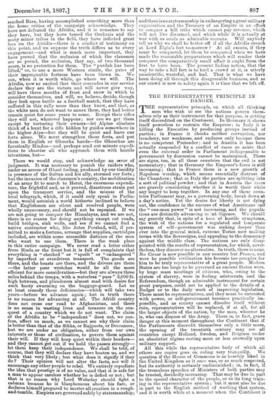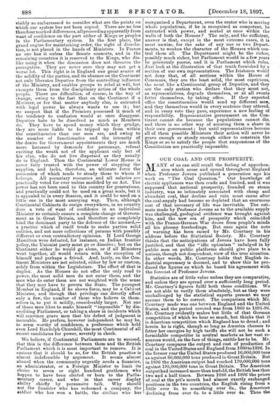THE REPRESENTATIVE PRINCIPLE IN DANGER. T HE representative principle, on which
all thinking men who wish to see the nations govern them- selves rely as their instrument for that purpose, is getting itself discredited on the Continent. In Germany it shows itself powerless to restrain the Emperor; in Italy it is killing the Executive by producing groups instead of parties ; in France it checks neither corruption, nor treachery, nor weakness, and endures only because there is no competent Pretender ; and in Austria it has been actually suspended by a conflict of races so acute that even the external order in Parliament indispensable to government by discussion cannot be maintained. There are signs, too, in all these countries that the evil is not momentary ; that in Germany the Emperor's force is still increasing ; that in France there is a new growth of Napoleon worship, which means essentially distrust of the Chambers ; that in Italy the parties are splitting into a sort of political powder ; and that in Austria the races are gravely considering whether it is worth their while any longer to keep together. In any one of these coun- tries Parliament may, as a governing body, break down at a day's notice. Yet the desire for liberty is not dying out, the confidence in the success of what Americans call the "one-man power" is not increasing, and the popula- tions are distinctly advancing in jut lligence. We should say gravely that, in spite of a host of hostile symptoms, the wish of the nations for a regulated and temperate system of self - government was sinking deeper than ever into the general mind, extreme Tories now making terms with the Sovereigns, and appealing to the democracy against the middle class. The nations are only disap- pointed with the results of representation, for which, never- theless, they discover no alternative. In truth, there is none. No Ccesar is now possible in any country but France, and were he possible civilisation has become too complex for him to be truly representative of a great people. Modern States are too large to be governed as ancient States were, by huge mass meetings of citizens, who, owing to the system of slavery, were in feeling aristocrats, and the Referendum, though an admirable instrument for certain great purposes, could not be applied to the details of a. Budget or to the daily work of improving legislation. There must be representatives, and they must be entrusted with power, or self-government becomes practically im- possible, and as society cannot dissolve itself without ruin, representatives will be replaced, if at all, for all the larger objects of the nation, by the man, whoever he is, who can dispose of the Army. There is, in fact, grave danger at this moment throughout the Continent that if the Parliaments discredit themselves only a little more, the opening of the twentieth century may see all countries except Holland, Sweden, and Belgium under an absolutist regime resting more or less avowedly upon military support. All this while the representative body of which all others are copies goes on ruling very tranquilly. We question if the House of Commons is as heartily liked in the -United Kingdom as it once was, or as much respected, but its authority is certainly undiminished ; is, in facts if the tremulous speeches of Ministers of both parties may be trusted, decidedly increasing. That may be due in part to the special character of the people, or to its long train- ing in the representative system ; but it must also be clue in part to the English method of working that system, and it is worth while at a moment when the Continent is visibly so embarrassed to consider what are the points on which our system has not been copied. There are no less than four marked differences, all proceeding apparently from want of confidence on the part either of Kings or peoples in the Parliamentary system. In the first place, the grand engine for maintaining order, the right of dissolu- tion, is not placed in the hands of Ministers. In France no one has it unless the Senate consents, and in the remaining countries it is reserved to the Kings, who dis- like using it when the discussion does not threaten the prerogative. They are never sure they may not get a worse lot. This right is in England one great source of the solidity of the parties, and its absence on the Continent not only liberates Deputies from the controlling influence of the Ministry, and enables groups to rebel at will, but exempts them from the disciplinary action of the whole people. There are difficulties, of course, in the way of change, owing to the fact that on the Continent if a Minister, or for that matter anybody else, is entrusted with legal power he always wants to use it ; but we suspect that if the Premiers possessed it much of the tendency to confusion would at once disappear. Deputies hate to be dissolved as much as Members do. They have to spend money which they grudge, they are more liable to be tripped up from within the constituencies than our men are, and owing to the number of functionaries and the intensity of the desire for Government appointments they are much more harassed by demands for patronage, refusal exciting the wrath not of the applicant only but of his clan, who do not live dispersed as they usually do in England. Then the Continental Lower House is never fully trusted with the power of stopping the supplies, and lacks, therefore, an ultimate force the possession of which tends to steady those to whom it belongs. All pecuniary resources and all salaries are practically voted for ever unless modified by an Act. The power has not been used in this country for generations, and practically could not be used on a great scale, but it is appealed to in every Session, and it could be used on a little one in the most annoying way. Then, although Continental Cabinets do resign everywhere, in no country does a vote of want of confidence in an individual Minister so certainly ensure a complete change of Govern- ment as in Great Britain, and therefore so completely bind the dominant party to the defence of the accused,— a practice which of itself tends to make parties solid entities, and not mere collections of persons with possibly different or even contradictory opinions. If Lord George Hamilton were defeated, for instance, on Indian frontier policy, the Unionist party must go or dissolve; but on the Continent either he would go alone, or if all Ministers went together, all would return with the exception of himself and perhaps a friend. And, lastly, on the Con- tinent Ministers are not selected, either by law or custom, solely from within the Legislature. The effect of that is duplex. As the Houses do not offer the only road to power, the most solid men do not enter them, and the men who do enter them are not weighted with the sense that they may have to govern the State. The youngest Member in England, if he shows force, may be a Cabinet Minister, and though that privilege can directly affect only a few, the number of those who believe in them- selves is, to put it mildly, considerably larger. Not one of those men likes to make himself "impossible" by dis- crediting Parliament, or taking a share in incidents which will convince grave men that his defect of judgment is incurable. He prefers, however independent he may be, to seem worthy of confidence, a preference which held even Lord Randolph Churchill, the most Continental of all recent candidates for power, severely in check.
We believe, if Continental Parliaments are to succeed, that this is the difference between them and the British Parliament which it is most important to remove. It is curious that it should be so, for the British practice is almost indefensible by argument. It seems almost absurd when the community urgently needs a financier, an administrator, or a Foreign Minister to limit its choice to seven or eight hundred gentlemen who happen to have been elected or born to the Parlia- mentary career, and who in that career display ability chiefly by persuasive talk. Why should not the financier who has redeemed a company, the soldier who has won a battle, the civilian who has reorganised a Department, even the orator who is moving whole populations, if he is recognised as competent, be entrusted with power, and seated at once within the walls of both the Houses ? The only, and the sufficient, answer is that, except in the most extreme cases, it is most unwise, for the sake of any one or two Depart- ments, to weaken the character of the Houses which con- trol them all. The Department might be the richer, possibly much richer, but Parliament would in a few years be grievously poorer, and it is Parliament which rules. Just look at the illustration of that truth furnished by a section of our own representatives. The Irishmen would not deny that, of all sections within the House of Commons, they are the least solid, the most capricious, the most like a Continental group of Deputies, and they are the only section who declare that they must not, as representatives, degrade themselves, or at all events fetter themselves, by taking office. If they expected office the constituencies would send up different mem, and they themselves would in every sentence they uttered, and in every vote they gave, experience a new feeling of responsibility. Representative government on the Con- tinent cannot die because the populations cannot die, and there is no other way of securing them a share in their own government ; but until representatives become all of them possible Ministers their action will never be grave enough or steady enough either to constrain the Kings or so to satisfy the people that suspensions of the Constitution are practically impossible.







































 Previous page
Previous page